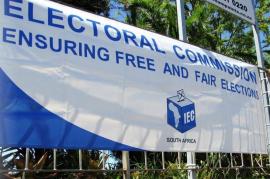
The National House of Traditional and Khoisan Leaders (NHTKL) has congratulated South Africans on the successful, free and fair elections.
This after millions of South African citizens participated in the peaceful process of democratic civic expression, making their voices heard through the ballot in the General Election held last month.
NHTKL chairperson, Kgosi Thabo Milton Seatlholo, said in keeping with the principles of a seasoned democratic nation, the 2024 National and Provincial Elections reflect a maturing multiparty democracy in practice.
Seatlholo said given that no party has achieved an outright majority, this mandates all elected political parties to work together, as per the wishes of the people.
He said the NHTKL was encouraged by the maturity of the country’s party politics, as demonstrated during the campaigning phase.
“To this end, we call on all parties to honour their individual and collective responsibilities of ensuring the establishment of the 7th democratic Parliament and Provincial Legislatures, based on a solemn commitment to advance the gains and interests of all South African people.
“On behalf of the traditional communities in particular, we, as the institution representative of their will and aspirations, advocate for the formation of a government that recognises traditional leadership as a vital pillar in our constitutional democracy and a custodian of diverse cultures as well as traditions,” Seatlholo said.
Seatlholo said the institution of traditional leadership, working together with government and the private sector, has recorded notable progress in the development of traditional communities.
The chairperson said the formation of a new government is also an opportunity to consolidate the gains and accelerate inclusive rural development, as espoused by the Traditional and Khoi San Leadership Act, the 2019 InvestRural strategy, the Developmental Monarchy approach, as well as Agrarian Revolution.
He emphasised that traditional leadership cannot remain outside of building the country through the formation of the 7th Administration.
Seatlholo said the NHTKL was eager to work with a government that is sensitive to the land question, respects and honours the history and role of traditional leadership, noting that the liberation struggle was rooted in the struggle for land, which was inherited from traditional leaders; respects the institution of traditional leadership, its place, and its relevance within the democratic dispensation, and appreciates the role of traditional leadership as custodians of culture and custom in shaping identity in a plural society, and the significance of customary law.
“The National House would like to highlight its eagerness to work with a government that recognises the role that the institution of traditional leadership plays in supporting the ideals of cooperative governance, which is the foundation of effective, interrelated spheres of government, and promotes social cohesion, nation building, the fight against GBVF [Gender-Based violence and Femicide], poverty, crime, and other social ills.
“Traditional leadership makes a humble submission that the new government must give rise to the implementation of the different programmes of the institution that seek to bring the marginalised poor people in rural areas to the mainstream in order to benefit from government interventions,” Seatlholo said.
The institution noted the voices of civil society and other stakeholders expressing their respective positions and making inputs into the process of forming the new government, which is currently unfolding.
It further expressed confidence in the leadership engaged in the negotiations geared towards the country’s future, and encouraged inclusivity, with the hope that "each will not be ruled by narrow interests or be bullied by forces outside of what is best for our country and its people".
“While no single direction will please everyone, the outcome has to inspire confidence and be in the interest of the majority of South Africa’s people,” Seatlholo said.
The NHTKL is a body composed of traditional leaders, who are delegates from the Provincial Houses. The traditional leadership represents over 20 million South Africans who reside in communities under the leadership of the institution. – SAnews.gov.za


